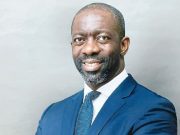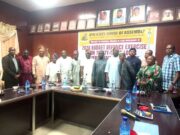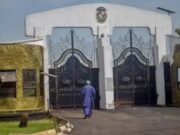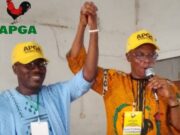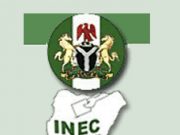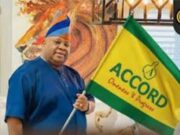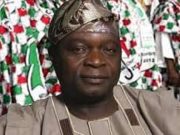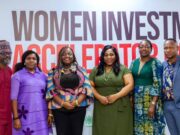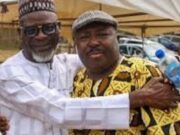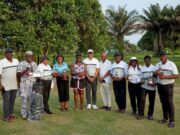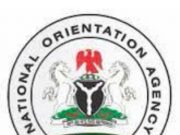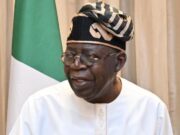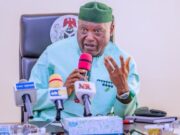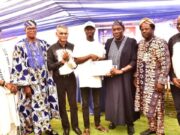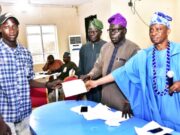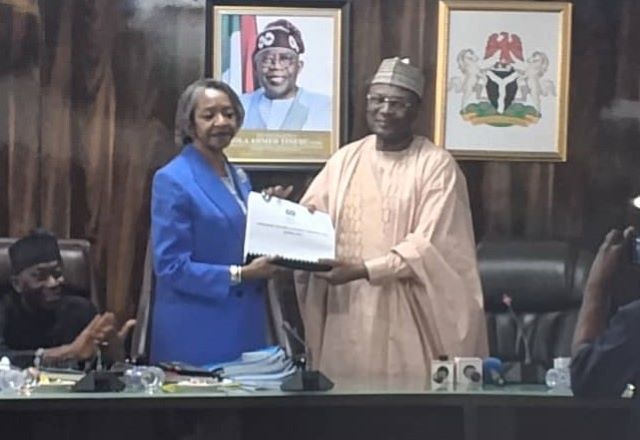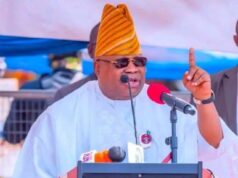A National Commissioner at the Independent National Electoral Commission, May Agbamuche-Mbu, has taken over as the acting Chairman of the Commission.
This followed the formal handover of duties by Professor Mahmood Yakubu, who is proceeding on a terminal leave.
The transition was announced during a stakeholders’ meeting with Resident Electoral Commissioners held on Tuesday at the INEC headquarters in Abuja.
Speaking at the meeting, Yakubu explained that he was stepping down in accordance with Section 306, Subsections 1 and 2 of the 1999 Constitution (as amended).
“In recognition of the significant challenges ahead, and having had the honour of serving the Commission for the past 10 years, with only a few weeks remaining in my tenure. I have made a decision.
“In the interim, I am handing over to one of the most senior national commissioners by date of appointment. Following consultation with other national commissioners, May Agbamuche-Mbu will serve in an acting capacity pending the appointment of a substantive chairman of the Commission.
“I hope that this will afford the appointing authorities adequate time to appoint a new chairman. It will also enable the new chairman to quickly settle down to the task of conducting elections and electoral activities in Africa’s most demographically and logistically complex environment.
“Since 2015, I have worked with 24 national commissioners and 67 resident electoral commissioners, so also to the staff of the Commission. Those involved in elections or vastly knowledgeable about election management understand the conduct of elections and what it entails. I will forever cherish the support of successive secretaries and staff of the Commission nationwide,” he noted.
Yakubu expressed gratitude to colleagues, stakeholders, civil society groups, development partners, and Nigerians, acknowledging their roles in supporting electoral processes during his tenure.
He also praised members of the National Youth Service Corps, calling them “among the most educated and most patriotic and also most knowledgeable election officials I have worked with.
“Above all, I thank Nigerians for their comments as well as criticisms, which encouraged rather than discouraged us to persevere.”
As part of his farewell, Yakubu presented two publications documenting the Commission’s work during his tenure: Election Management in Nigeria 2015–2025 and Innovations in Electoral Technology 2015–2025.
“All that remains at this point is for me to pray that God will continue to bless our country and our democracy,” Yakubu said as he handed over to Agbamuche-Mbu.
He added, “It is now my pleasure to sign my official handing over notes and present the same to Agbamuche-Mbu. And from that point, I will take my exit.”
Before taking his exit, the outgoing chairman outlined the Commission’s preparations for several upcoming elections, including the Anambra State governorship election next month, the Area Council election in the Federal Capital Territory in February 2026, the Ekiti State governorship election in June 2026, and the Osun governorship election in August 2026.
He also confirmed that “INEC has already begun preparations for the 2027 general elections” while awaiting the passage of “a new Electoral Act currently before the National Assembly.”
“Beyond these reviews, the commission needs to further clean up the voters’ register, review the locations of some of the polling units, and allotment of voters to them. The management of party primaries is another major area of activity,” he said.
Yakubu reflected on the logistics and challenges of managing Nigeria’s electoral process, highlighting issues such as insecurity, natural disasters like floods, and the need to update frameworks for internally displaced persons’ voting.
“Over the years, we achieved a lot in responding to challenges and monitoring our introducing many innovations. We have consolidated the biometric register of voters and replaced many of our manual processes with digital platforms and applications,” he said.
He listed innovations introduced under his leadership, including technologies for locating election facilities, virtual training, management of political party finances, and monitoring elections through the Election Monitoring and Support Centre.
“Indeed, we have made tremendous progress, but a lot more needs to be done,” he said.
Before his foray into electoral administration, Yakubu, born in May 1962, served as Executive Secretary of the Education Trust Fund.
Former president Muhammadu Buhari appointed Yakubu as INEC on October 21, 2015, following Senate confirmation, and he assumed office on November 9, 2015, succeeding Professor Attahiru Jega.
In 2020, he was reappointed for a second five-year term, again confirmed by the Senate — first in Nigeria’s democratic history.
Credit: punchng.com



















